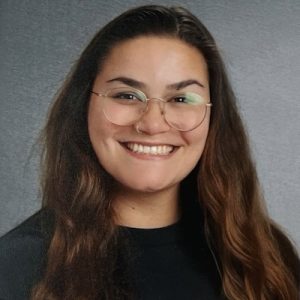
Following is a Q&A with Britta Hesselberg, who graduated from the Learning Analytics master’s program (LAMP) in 2024. Hesselberg previously earned an undergraduate degree in special education from UW–Madison and today is a special education teacher in Madison.
How did you get interested in this field of learning analytics?
Hesselberg: I became interested in learning analytics when I was researching master’s programs that would satisfy my passion for education while advancing my knowledge of analytics to support my pursuit of a PhD. The Learning Analytics program at UW was perfect for that!
How did you decide that UW–Madison was the right place to pursue this degree?
Hesselberg: UW–Madison was my alma mater, and Julia Rutledge, the program director, was a professor of mine when I was an undergrad. I had thoroughly enjoyed attending UW–Madison and the academic rigor it provided me. In addition, Julia was a phenomenal professor and I knew that any program she was piloting would be a good one.
What are you doing professionally today?
Hesselberg: I am a passionate high school special education teacher in Madison. I caseload and teach students with high-support needs and or intellectual disabilities in self-contained and inclusive classroom settings. I specialize in behavior management and promoting inclusive teaching practices. The Learning Analytics program really supported my data collection and education psychology skills within my profession.
What was your most meaningful experience with the Learning Analytics program?
Hesselberg: The most meaningful experience within the Learning Analytics program was easily the group capstone project. Our research topic was, “Disproportionate Discipline,” which looked into inequitable behavior reporting practices within our target school district toward marginalized groups of students. Our group was able to take school district data, analyze it, create visualizations, and present it to the district with further implications on how they could use our analyses for the better of the district. I found this the most impactful because it was the district where I teach and it was an issue I saw unfold on a daily basis. It felt like I was actually making a difference with the work I was creating.
What class or professor had the greatest impact on you, and why?
Hesselberg: I would definitely say that the first class of the program, Ed Psych 560: Foundations in Quantitative and Qualitative Research Methods, had the greatest impact on me because of how it challenged me in ways I have never experienced — both academically and professionally. In this course, we learned about quantitative and qualitative research: data collection, data analyses, statistics, etc. Sitting at my computer in the late hours of the night, trying to navigate R and coding, I remember feeling so overwhelmed. Am I cut out for data science? Is a PhD way over my head if I can’t quickly grasp this content? Before I let imposter syndrome run its course, I contacted Julia Rutledge, the LAMP program director. She was exactly what I needed at that time. Julia reassured me that this was the hardest course of the program, that how I was feeling was valid, and I had what it took to be successful here. Hearing that from Julia, a successful woman in academia who inspired me to pursue research in the first place, was exactly what I needed to keep going. It was completely worth the late nights of coding. I will never forget the pride I felt at graduation day, that I had a master’s degree In Learning Analytics. Thank you, Julia, for helping me see my potential and reach new limits!
How, if at all, has the Learning Analytics program at UW–Madison helped you get to where you are today?
Hesselberg: The Learning Analytics program was what I needed to kickstart my journey into academia. It helped me see that I have what it takes to pursue my passion — special education and disability social justice — at a whole new level. It provided me with new skills that will be useful no matter where I take my career: teaching at a high school, lecturing a college course, or becoming an administrator. That’s what I really loved about this program — it gives me options for my future, and that is very reassuring. It has helped me feel prepared for whatever I choose to do with my career as a passionate special educator.
What are your future goals or plans?
Hesselberg: In a perfect world, my future would consist of pursuing my PhD in special education, while still teaching high school students the importance of inclusion and disability social justice. For now, I am doing my dream job of teaching at the high school level, while researching and applying to special education PhD programs. The future is scary, but thanks to Julia and the LAMP program, I’m ready for it!